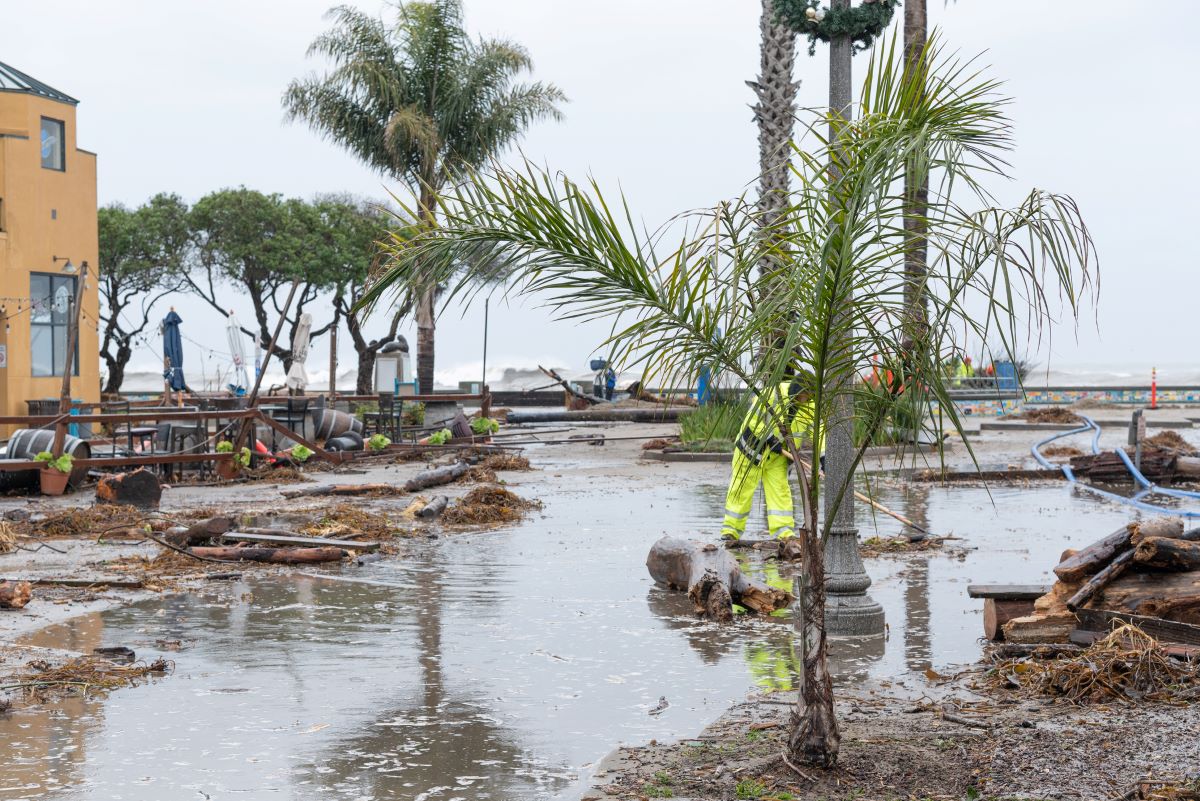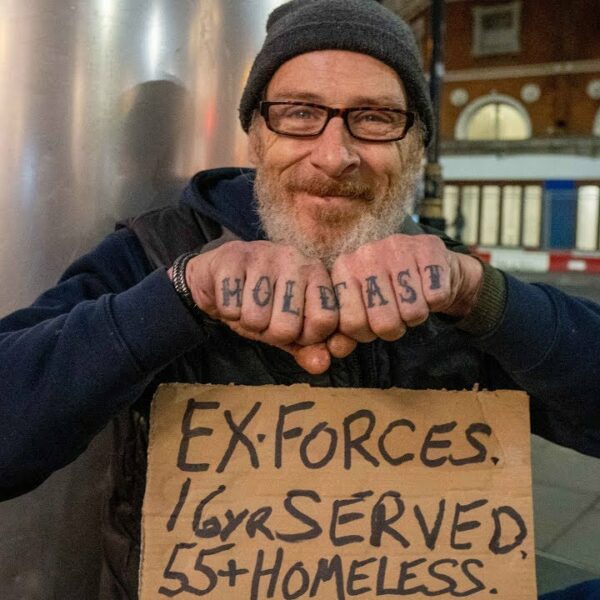California is home to 31% of all homeless veterans across the United States. Many are unsheltered, meaning they spend most nights outside, sleeping in places unfit for human habitation. Meanwhile, this region of North America continues to be ravaged by devastating wildfires disintegrating acres far and wide, not to mention deadly floods.
“One of the worst parts is I don’t have any news. I don’t have TV so I can’t watch the news… I either have power, or I don’t have power, so I can’t really get any weather advisories on my phone,” explained one Skid Row resident in a candid interview with Invisible People.
Skid Row in a rainstorm resembles a battlefield – dusty, muddy, and bleak. For many unsheltered homeless veterans, the war for housing here has already been lost.
“It rained last night, and I got cold. I started freezing,” said Carolyn, another unsheltered Californian seeking refuge from a torrential downpour.
While California has a hard-earned reputation for sunny skies and balmy weather conditions, the amount of rainfall in the state in 2023 is unprecedented. Meteorologist David Sweet says rainfall measurements are up an astonishing 200% in LA, a condition some believe was caused by atmospheric rivers and rushing cold fronts.
In the bordering tent cities where homeless veterans rest beneath tattered American flags, water capsizes makeshift shelters. Plastic tarps rip at the seams. Some of the most vulnerable people in the nation sleep in pools of water, dripping through their socks and dampened clothing.
Such is the fate of the forlorn former soldier who is given nothing but bootstrap theories and empty promises of future housing.
Nearly Half of All Homeless Veterans Live Outside
The odds are stacked against US veterans in terms of homelessness. Not only is this subgroup of the population 50% more likely to endure homelessness than people who never enlisted, but veterans who become homeless are also statistically more likely to live outside than other members of the unhoused population.
According to the US Department of Veteran Affairs, approximately 41% of all homeless veterans were classified as unsheltered. Compare this to 37% of the overall homeless population.
Because homeless veterans are more likely to live outside than their non-veteran peers, this means they are more likely to be arrested for violating quality-of-life ordinances. It also means they are more likely to get pummeled by these storms. While these two scenarios might not seem related at first glance, both of these conditions elevate the risk of losing:
- Necessary paperwork, including government-issued identification
- The tents they sleep in every night
- Vital, life-saving medications or prescriptions
- Clothing, food, hygiene products, and other necessities
Whether these items are swept away by law enforcement officials or washed away in a flood makes very little difference. Ultimately, such losses serve as significant setbacks that can perpetuate the vicious cycle of homelessness or even lead to death.
Post-Tropical Storm Hilary: The Latest Deadly Flood to Rush Unsheltered Veteran Territory
With limited means of communication, unsheltered homeless individuals in LA County, both veterans and non-veterans alike, received an urgent warning via bullhorn from the sheriff’s department in the moments leading up to the encroaching post-tropical storm.
“You are in extreme danger,” the ominous voice warned overhead. “If you’re underlying, seek higher ground immediately.”
The post-tropical cyclone known as Hilary tore through the West Coast last month, a weather anomaly that could symbolize things to come. The record-breaking rainstorm showered desert towns in Southern Cali, putting a damper on the Sunshine State. Road closures, floods, and muddied streets engulfed the region.
A homeless encampment on the banks of the San Diego River overflooded, and firefighters were forced to wade in waters up to their knees to rescue 13 unsheltered individuals. The flashfloods bristled on, creating the wettest day that San Diego’s ever seen.
Thankfully, no deaths have been reported in California from Tropical Storm Hilary as of this report. But it’s important to point out that several unhoused people lost their makeshift shelters as their tents and tarps became mere fodder for the wind. Given the erratic nature of California’s weather this year, this leaves them even more vulnerable when the next storm arrives, which could be any time.
In an interview with CBC Radio, Ktown for All activist Andreina Kniss described a disparaging scene where local unsheltered individuals abandoned a burgeoning sea of collapsed tents and torn-down tarps in search of stable shelter. She pointed to the growing trend of increased homeless criminalization – sweeping encampments every week and discarding homeless people’s possessions – as a glaring reason for the devastation.
According to Kniss, the constant encampment eviction procedures force unsheltered residents “to seek refuge in more desolate locations and more dangerous places — as far away from being noticed as possible, just looking for some stability.”
The Harrowing Storm of Homeless Criminalization and Climate Change Spells Trouble for Vulnerable Populations Across the Country. Former Soldiers are Among the Most Impacted.
The current climate of the United States is ever-changing, shifting away from the patriotic picture once painted of servicemen and women.
As of 2023, US veterans are statistically more likely to become homeless. Once homeless, they are statistically more likely to be unsheltered. Once unsheltered, they are statistically more likely to be targeted through quality-of-life ordinances and anti-homeless legislation.
This leads them to seek refuge in more obscure and perilous places along rivers, shorelines, abandoned railways, and more. Once positioned in these more treacherous locations, these same former soldiers become statistically more likely to lose their possessions, makeshift shelters, and even their lives in these storms. Isn’t it time the rain stopped pouring?
Talk to Your Legislators About Ending Veteran Homelessness
The good news is that veteran homelessness has recently been reduced using Housing First strategies. Contact your local legislators about adopting these cost-effective and proven strategies to end all homelessness – veteran and otherwise.













